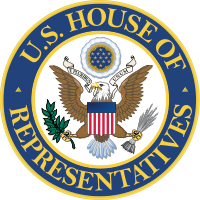 On August 8, 1911, President William Howard Taft signed a bill authorizing an increase in the size of the House of Representatives from 391 members to 433. A provision in the bill also provided that two additional members would be added in 1912, following the scheduled admission of New Mexico and Arizona as the 47th and 48th states, and thereby raising the size of the House to 435, which is still the size of the House.
On August 8, 1911, President William Howard Taft signed a bill authorizing an increase in the size of the House of Representatives from 391 members to 433. A provision in the bill also provided that two additional members would be added in 1912, following the scheduled admission of New Mexico and Arizona as the 47th and 48th states, and thereby raising the size of the House to 435, which is still the size of the House.
This means that since the admission of Arizona as the 48th state on Valentine’s Day, 1912, the size of the House of Representatives has remained unchanged for the 101.5 years. (The admission of Alaska and Hawaii in 1959 increased the size of the United States Senate from 96 members to 100, but a decision was made at that time to keep the size of the House at 435.)
The 1910 Census reported the population of the United States as slightly more than 92 million people. In comparison, the figure for 2010 was slightly less than 309 million, an increase of more than 330%. This means that every Congressman today represents more than three times as many people as his or her counterpart of a century ago.
The original idea regarding representation was that congressional districts should be small enough that citizens would have confidence that their elected representative would be able to represent their immediate interests. However, the average congressional district of today has more than 700,000 constituents and is larger than 16 of the 46 states in 1910.
If we go back further into our constitutional past, the disparity is even greater. In the Congressional Resolution passed on September 25, 1789, endorsing a Bill of Rights for the Constitution and submitting the proposed amendments to the states, the original First Amendment required the creation of a minimum of one congressional district for every 50,000 people.
As it turned out, this was the only one of these “original” amendments that did not become part of the Constitution. Had the original first amendment been adopted, Congress today would be made up of approximately 6,180 members, which all but the most fervent admirers of the Founding Fathers and advocates of constitutional localism would likely agree is too large.
Under the relevant provisions of the Constitution (Article I, sec. 2, cl. 3, and Sec. 2 of the Fourteenth Amendment) the size of the House of Representatives is left entirely to the Congress to determine, with the restriction that unless the population of a state is under that number, every Congressional District must have a population of at least 30,000 citizens. This would currently rule out the possibility of a 10,300 seat House (or anything larger).
But to say that 6,000 (or 10,000) members is too many does not mean that 435 is not too few. Had the ratios embraced by the 1911 bill remained the norm, there would currently be 1,436 members in the House of Representatives. While most observers would react by saying that 1400 would also be too large, would that actually be the case? Or is that reaction just a predictable response to the unfamiliarity of the idea. (We are conditioned by experience to assume that 435 is the proper size of the House of Representatives. To remember a House that did not have 435 members, a person would have to be at least 110 years old, which is pretty much the equivalent of remembering the Chicago Cubs winning the World Series.)
It does seem possible that the House of Representatives in its current form is too small and that representatives are too far removed from their constituents, at least by traditional norms. Perhaps an influx of additional new members could help improve the image of Congress, which appears to be at an historic low. One thing is clearly true, dealing with a 6,000-member House of Representatives would change the way that lobbyists do business.


